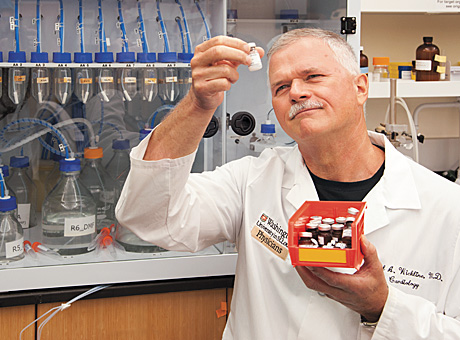
Samuel A. Wickline, MD, the inaugural recipient of the J. Russell Hornsby Professorship in Biomedical Sciences

Samuel A. Wickline, MD, the inaugural recipient of the J. Russell Hornsby Professorship in Biomedical Sciences
James Russell Hornsby’s company, Cepia Inc., was founded on the premise that sufficiently advanced technology is indistinguishable from magic. With that in mind, he has created a world of electronic toys that entertain and delight children and adults alike.
Chief among the company’s successes are the popular robotic Zhu Zhu Pets, included on Time magazine’s “All-TIME 100 Greatest Toys” list. But Hornsby’s interest in technology doesn’t end with his devotion to toys; he’s also fascinated with how technology can spur advancements in medical research, with a particular focus on curing cancer and other major diseases.
A former undergraduate parent, his affiliation and appreciation of Washington University were already solidified. As an avid supporter of various community philanthropic organizations, the St. Louis-based Hornsby expressed interest in building a relationship with the School of Medicine that would support medical science and the groundbreaking achievements of the school’s physician-scientists.
That determination to give back resulted in the establishment of the James R. Hornsby Family Professorship in Biomedical Sciences. This significant gift will be used to support the work of the professorship’s inaugural recipient, Samuel A. Wickline, MD, professor of medicine, of physics, of cell biology and physiology, and of biomedical engineering.
Truly advanced, groundbreaking technology can change the way medical diagnoses are made and improve the safety and efficacy of drug treatment.
A successful entrepreneur in his own right, Wickline established the Washington University Consortium for Translational Research in Advanced Imaging and Nanomedicine, known as C-TRAIN. Located at the St. Louis CORTEX Center, C-TRAIN is devoted to diagnostic and therapeutic development of nanotechnology for broad-based clinical applications, in conjunction with corporate and academic partners.
Mirroring Hornsby’s premise, Wickline’s pioneering nanoparticle research has shown that truly advanced, groundbreaking technology can be used to create another type of magic — changing the way medical diagnoses are made and improving the safety and efficacy of drug treatment, thereby benefitting patients.
Imagine being able to replace multiple medical tests, scans and treatments with a single injection. That’s the promise offered by nano-particles, extremely small, bead-shaped units that can become carriers of medicine. Using these tiny particles, doctors will be able to locate disease sites deep within the body and at the same time determine their size, shape and molecular features. They can then adapt the nanoparticles to deliver therapeutic drugs exactly where needed and personalized to each patient.
In addition to his research, Wickline created the Siteman Center of Cancer Nanotechnology Excellence at the Siteman Cancer Center at Barnes-Jewish Hospital and Washington University School of Medicine. The center is devoted to nanomedical therapeutics for cancer. He also established the St. Louis Institute of Nanomedicine, a consortium of academic and commercial partners devoted to enhancing regional infrastructure for the translational advancement of nanotechnology in medicine.
Hornsby’s entrepreneurial spirit is a perfect match for Wickline’s research efforts. The James R. Hornsby Family Professorship in Biomedical Sciences and Wickline’s development of nanoparticle technology will continue to give hope that one day we will see the magic and no longer have to only imagine.